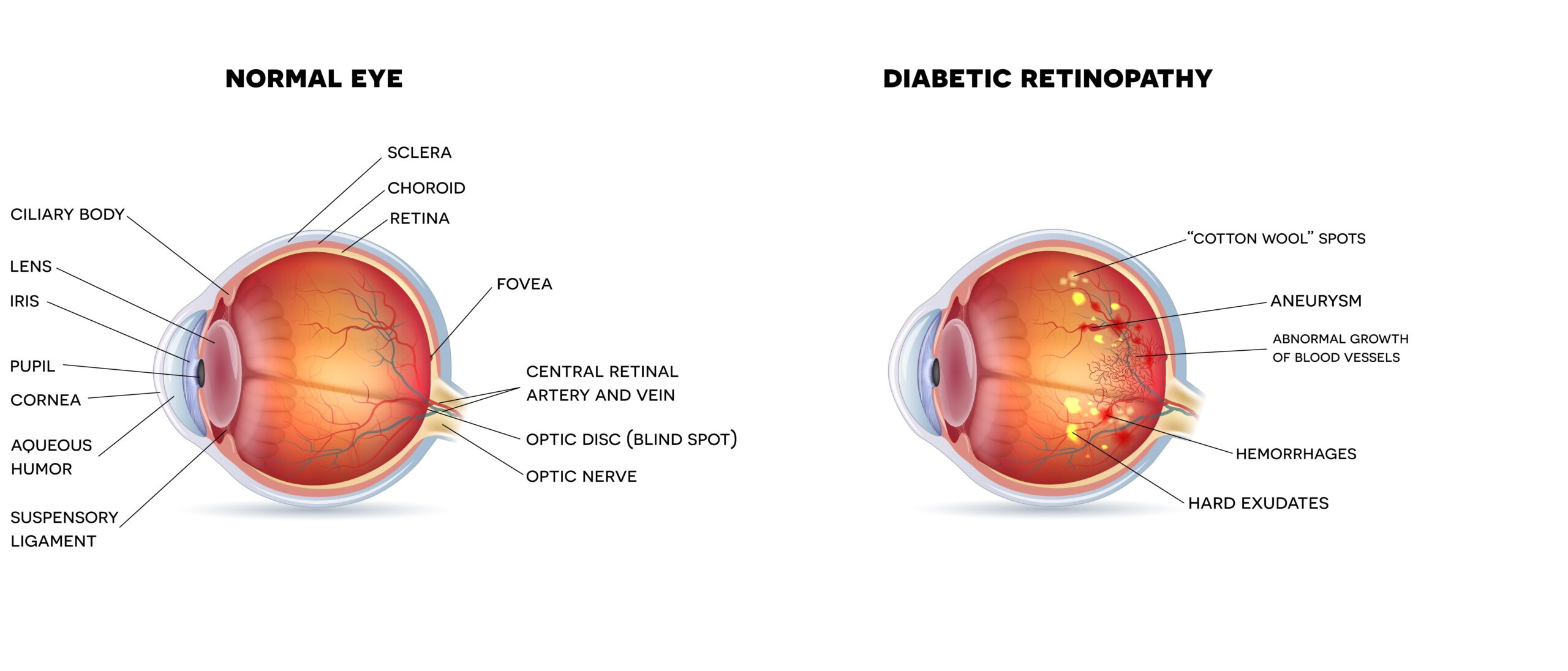Diabetic Retinopathy Eye Treatment in Kansas City, MO
Diabetes is a condition in which the body’s ability to process and store sugar is impaired. Approximately 16 million Americans have diabetes. Many are at risk for vision loss as a result of diabetic eye disease, simply because they don’t know they have it. Unfortunately, people with diabetes are at a higher risk for developing vision complications, and even blindness. Diabetic eye care is extremely important. Finding an eye doctor you are comfortable with and having your vision monitored by a diabetic eye center is the best way to manage your condition.
What Is Diabetic Retinopathy?
How does diabetes affect the eyes? The longer you have diabetes, the greater your chances are to develop eye problems associated with diabetes and your eyesight, particularly if your blood sugar does not remain at the expected level. Diabetic retinopathy is a complication with diabetes caused by deterioration of blood vessels in the retina. If you have diabetes type 1 or type 2, unfortunately, you are at higher risk for developing eye problems with diabetes such as severe vision loss or even blindness. Annual eye exams are extremely important to monitor the health of your eyes and to prevent progression of diabetic retinopathy. Your eye doctor may suggest having more frequent eye check ups. Rather than every twelve months, it may be recommended to see your eye doctor for a diabetic eye check every six months. The frequency of your eye exam should be a conversation between you and your optometrist or ophthalmologist based on the current health of your eyes.
Diabetic Retinopathy Symptoms & Signs
In the early stages, there are often no symptoms or signs of diabetic retinopathy. Vision may not be affected until the disease becomes severe. You should schedule an appointment if you experience any of the following diabetes eye symptoms:
- Blurry eyes
- Blurred vision lasting more than a few days
- Blurred vision not related to change in blood sugar
- Floaters
- Eye pain and headache
Treatments for Diabetic Retinopathy
The best diabetic eye disease treatment is prevention. Scheduling routine eye exams, and taking care of your health by monitoring your blood sugar and blood pressure levels can slow eye disease progression and help prevent early stages of diabetic eye conditions. However, there are now several treatments that ophthalmologists that specialize in diabetic eyecare offer to stop progression of diabetes related vision loss.
Diabetic Retinopathy Laser Treatment
Laser treatment (Photocoagulation) has been used to treat diabetic retinopathy and macular edema for over 30 years. Treatment involves a laser that is used to shrink and seal blood vessel damage. It is most effective at preventing vision loss if administered before the retina is seriously damaged. More severe proliferative retinopathy can be treated through a scatter laser treatment called Panretinal Photocoagulation which limits blood vessel growth on the back of your retina.
Eye Injections for Diabetic Retinopathy
Eye Injections are another common treatment for Diabetic Retinopathy. This treatment involves the injection of anti-inflammatory medications called Anti-VEGF drugs which inhibit vascular endothelial growth factor. These medications go by the brand names Avastin, Lucentis, and Eylea and they suppress retinal swelling and blood vessel growth. Eye injections must be repeated regularly, usually every one to two months, to maintain their positive effects.
Vitrectomy
Some patients suffer from vitreous hemorrhage (bleeding), retinal detachment, or in some cases scar tissue formation that can result in severe vision loss. This damage is treated by a procedure called a Vitrectomy in which the vitreous gel, along with the abnormal blood, is removed surgically. This surgery is rarely required for people with early-stage retinopathy, and is used only in result of the more serious conditions listed above.
Book Your Diabetic Eye Exam Today!
If you have diabetes, it is crucial to stay on top of diabetic eye issues. Discover Vision Centers offers diabetic eye exams near you. Schedule your examination today!
GET CONSULTATION
Diabetic Retinopathy Types & Stages
There are two stages of diabetic retinopathy, Non-proliferative (NPDR), and Proliferative (PDR), NPDR encompasses the early stages of diabetic retinopathy. During this stage blood vessels located in the retina begin to leak fluid and blood, causing retinal swelling. If the leakage spreads to the macula ( the central part of the retina and the area that is essential to your central vision) it can cause blurred or partial loss of vision.
If NPDR is untreated it can develop into Proliferative diabetic retinopathy. In this stage abnormal blood vessels will form due to poor circulation to the retina and macula, and will start to leak blood and fluid more severely. This alone can cause serious vision loss, but if left untreated they can develop scar tissue that can detach the retina, or cause pressure levels in the eye to rise to an unsafe level resulting in neovascular glaucoma.
All of these complications are very dangerous, and if not treated can lead to vision loss or blindness.
Diagnosis of Diabetic Eye Problems
Early diagnosis of Diabetic eye disease is the most effective way to prevent vision loss. Diabetic eye disease can be diagnosed through an initial diabetic eye screening and then a yearly comprehensive diabetes eye examination with an ophthamologist or optometrist. During this examination the optometrist or ophthalmologist will dilate your pupils, check your vision and measure your eye pressure.
Eye exams used to diagnose Diabetic eye disease include:
Tonometry
Measures the pressure in the eye to check for glaucoma.
Ophthalmoscopy & Slit Lamp
This test allows your eye doctor to see the structures inside your eye and the back of your retina. They are most often used to look for cataracts or any other abnormal changes.
Visual Acuity Testing
This test measures distance and close vision to screen for vision loss and other issues.
Areas We Serve
Discover Vision Centers serves the greater Kansas and Missouri area with surgery centers in Leawood, KS, Independence, MO, and Kansas City, MO.
Why Choose Diabetic Retinopathy Doctors From Discover Vision?
Discover Vision is a leading vision correction center in Kansas City, MO. Our specialists offer a range of services, including but not limited to, diabetic eye exams and laser treatments. Choosing an eye doctor for diabetics may seem daunting, but the key is to find a doctor you feel comfortable with. Discover Vision has retina specialists and top doctors who are known nationally and internationally for their contributions to leading-edge eye care, research, and ground-breaking technologies and solutions. Discover Vision Centers has:
- 9 clinic locations with full-service optical shops
- 3 LASIK / SMILE laser vision correction centers
- 3 eye surgery centers in Missouri and Kansas
Reviews
Contact Diabetic Retinopathy Specialists Near You Today!
Our medical eye doctors are board-certified, highly-trained specialists who regularly participate in research involving innovative, ground-breaking technologies and solutions. To learn more about receiving Diabetic Eye Care from a Discover Vision retina specialist, call 816.542.7157 or click here to schedule an appointment online.
GET CONSULTATIONFAQ
Can diabetic retinopathy be reversed?
The effects of diabetic retinopathy are not fully reversible. However, there are some treatments that may help partially restore your vision. The goal with most diabetic retinopathy treatments are to prevent further damage and stop your vision from worsening.
How long does it take for diabetes to damage eyes?
Diabetic retinopathy is a result of unregulated high blood sugar levels. It usually takes between 5-10 years for diabetes to effect your eyes, but diabetic retinopathy can be present for several years before noticeable symptoms develop.
Diabetic Retinopathy Eye Treatment in Kansas City, MO Doctors


